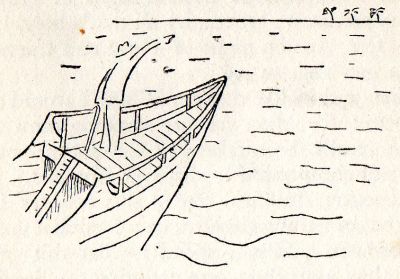Chapter Thirty-two – Carabela
Carabela
IT is anchored on the Guadalquivir near the Torre del Oro, where Spanish ships used to unload Peruvian gold; and it is said to be an exact model, to the last plank and rope, of the carabela Santa María on which Christopher Columbus discovered America.
I went to have a look at it in the hope that, as a result, something would occur to me on the subject of Christopher Columbus; I went right through it, from the lower deck to the top; I lay down on the bed in the cabin of Columbus, and as a souvenir I took a number of La Vanguardia which was lying on the table there, apparently another relic of Columbus; I meddled with the falconets or culebrinas or whatever they call those old cannons, during which process I nearly broke my leg with an iron bullet, for they were loaded, but I discovered nothing but my own astonishment at finding such a famous ship so small. I doubt whether the Port of London authority would allow it to be used for passenger traffic as far as Tilbury.
But up on deck I remembered that behind me was the Ibero-American Exhibition; and when it was closed, its existence would be perpetuated by a large Ibero-American University which, so we Sevillanos hope, will be attended by young caballeros from Mexico and Guatemala, Argentine and Peru and Chile.

At that moment I felt terrible anxious to be a Spanish patriot and to exult aloud, thus: Hombres, just consider that there yonder, on the other side of the ocean, there are millions and millions of people who speak a language in accordance with the dictionary of the Madrid Academy.
Now although the countries there are as plentiful as blackberries, there is only one nation, and if it were to set about the job properly, there would be only one civilisation, too, ¿sabe? I imagine, caballeros, what would happen if all the people who kept to the dictionary of the Madrid Academy were to throw in their lot together; this would immediately produce something which not even the League of Nations has managed to bring about – A Euroamerica, an inter-continental alliance of the white race. Why, this would be just like a new discovery of America.

Just fancy how we Iberians would open the eyes of those Great Powers which their everlasting disputes about tonnage and calibre!
Amigos, every extranjero, who trots into our country by way of Irún or Portbu, only has to glance around and he at once notices that of old we Spaniards showed signs of greatness and supremacy; where, by all that’s holy, has it gone to? In the name of Goya and Cervantes, let us get back to it!
That and in like manner is how I would speak to them; for when you are standing on a vessel which recalls the carabela of Columbus, you feel a sort of compulsion to discover America. I did not discover America, but in this country I discovered something closer to us; I think it is called nationalism. What I mean is that this nation, more than any other – not counting the English – has succeeded in preserving its own particular way of life; from the women’s mantillas to the music of Albéniz, from the household usages to the street traders, from the caballeros to the donkeys, it prefers its old Spanish manners to the veneer of international civilisation.
This may be due to the climate, or to the fact that the country is almost an island; but first and foremost it is a question of character. Here local pride makes every caballero hold his head high; the Gaditano glories in being a man of Cadiz, and the Madrileno in being a man of Madrid; the Asturian is proud to be a man of Asturias, and the Castilian is proud in general; for each of these names has the renown of an escutcheon. In consequence of which, the Sevillan, I hope will never demean himself so far as to become a good international European; for he would not become even a Madrileno.
One of the deepest secrets of Spain is its provincialism, a peculiar virtue which, in the rest of Europe, is dying out; a provincialism which is the joint product of nature, history and people. Spain has not yet ceased to be in close touch with nature, and has still not lost sight of its history; that is why it has managed to preserve itself to such an extent.
And all that the rest of us can do is to observe, with a certain amount of wonder, how fine a thing it is to be a nation.
